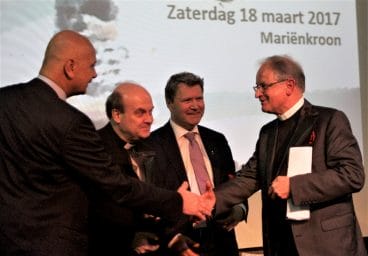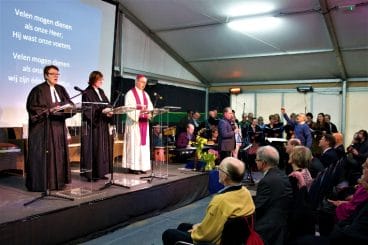 After the historic encounter between the World Lutheran Federation and the Catholic Church last October in Sweden, the 500th anniversary of the Reform has given rise to ecumenical events around the whole world. The March 18th On the Way to Unity Meeting was promoted by the Catholic Athanasios en Willibrord Association for Ecumenism and the Focolare Movement. The date chosen was meant to coincide with the departure of Chiara Lubich, whose commitment to Christian unity is famous. The encounter took place at the Focolare’s Marienkroon village, a hundred kilometres from Amsterdam. Three hundred and eighty people including prominent leaders of several Christian denominations attended. The event showed a people on the way, as the title of the event wished to express. A broad tent was set up that was filled to the brink, until an addition was added for the overflow crowd. The five-hour event included reflection, meals, testimonies, songs and artistic presentations. The highpoint was the moment of common prayer. The large turnout and the fraternal atmosphere created among all, including the leaders of the Churches, made the day seem historic as the director of the Catholic Association for Ecumenism, Geert van Dartel, affirmed. But it was also an “ecumenical feast,” one of the participants remarked.
After the historic encounter between the World Lutheran Federation and the Catholic Church last October in Sweden, the 500th anniversary of the Reform has given rise to ecumenical events around the whole world. The March 18th On the Way to Unity Meeting was promoted by the Catholic Athanasios en Willibrord Association for Ecumenism and the Focolare Movement. The date chosen was meant to coincide with the departure of Chiara Lubich, whose commitment to Christian unity is famous. The encounter took place at the Focolare’s Marienkroon village, a hundred kilometres from Amsterdam. Three hundred and eighty people including prominent leaders of several Christian denominations attended. The event showed a people on the way, as the title of the event wished to express. A broad tent was set up that was filled to the brink, until an addition was added for the overflow crowd. The five-hour event included reflection, meals, testimonies, songs and artistic presentations. The highpoint was the moment of common prayer. The large turnout and the fraternal atmosphere created among all, including the leaders of the Churches, made the day seem historic as the director of the Catholic Association for Ecumenism, Geert van Dartel, affirmed. But it was also an “ecumenical feast,” one of the participants remarked.  “Unity in diversity is not something that we can ‘fabricate’ on our own, but it is a gift from God,” warned Catholic Luther scholar, Hubertus Blaumeiser from the Focolare’s international Abba School centre for studies. Looking back at Lund’s ecumenical agenda, he cited a few words from Chiara Lubich: “The music gets written in Heaven.” It’s up to us to learn how to read that music. In any case, he went on, from the moment that Jesus gave his life for everyone on the cross, unity has been a given. Our task is to respond to that. This explains the first of five “ecumenical imperatives” that were signed in Lund, which recommend that we always begin from the perspective of unity and never separation. But what must be done so that this unity becomes concrete in the midst of oftentimes difficult situations after years of division? Placing ourselves behind the Triune God of Jesus, we are all called to an exodus,” said Blaumeiser, to go out of ourselves and learn to “think and live with the other as our starting point,” and that is “not only at the level of individuals, but also at the level of entire faith communities.” Ultimately, ecumenism is a process to be carried out with Jesus: from death to resurrection. “Unity begins wherever one has the courage to face the difficulty, to enter in with Jesus into the wounds of separation, welcoming one another even when that can be tiresome and difficult. The “ecumenical imperatives” say that we have to let ourselves be changed by the encounter with the other and thereby seek the visible unity [of Christians] and bear witness to the power of the Gospel together. The president of the Dutch Catholic Bishops Conference, Bishop Van den Hende; the General Secretary of the Protestant Churches of the Netherlands, Dr Reuver; and National Coordinator of the Pentecostal Community, Peter Sleebos, responded to those ideas. Commenting on the orientations that were described, they expressed further motives and thoughts, drawing on their own faith traditions. In the afternoon ecumenical testimonies were presented that illustrated what Chiara Lubich liked to call the “dialogue of life”. This was followed by an open discussion with the presenters. One participant commented: “This Saturday we managed to ‘play’ the beautiful notes of the music that is written in Heaven ‘together’.” “This meeting,” declared Pastor René De Reuver to the Catholic Journal, “was very special. I experienced the presence of Christ in the enthusiasm, in the communion and in the passion for union in Him. This doesn’t take away the differences, but leads us to enrich one another mutually.”
“Unity in diversity is not something that we can ‘fabricate’ on our own, but it is a gift from God,” warned Catholic Luther scholar, Hubertus Blaumeiser from the Focolare’s international Abba School centre for studies. Looking back at Lund’s ecumenical agenda, he cited a few words from Chiara Lubich: “The music gets written in Heaven.” It’s up to us to learn how to read that music. In any case, he went on, from the moment that Jesus gave his life for everyone on the cross, unity has been a given. Our task is to respond to that. This explains the first of five “ecumenical imperatives” that were signed in Lund, which recommend that we always begin from the perspective of unity and never separation. But what must be done so that this unity becomes concrete in the midst of oftentimes difficult situations after years of division? Placing ourselves behind the Triune God of Jesus, we are all called to an exodus,” said Blaumeiser, to go out of ourselves and learn to “think and live with the other as our starting point,” and that is “not only at the level of individuals, but also at the level of entire faith communities.” Ultimately, ecumenism is a process to be carried out with Jesus: from death to resurrection. “Unity begins wherever one has the courage to face the difficulty, to enter in with Jesus into the wounds of separation, welcoming one another even when that can be tiresome and difficult. The “ecumenical imperatives” say that we have to let ourselves be changed by the encounter with the other and thereby seek the visible unity [of Christians] and bear witness to the power of the Gospel together. The president of the Dutch Catholic Bishops Conference, Bishop Van den Hende; the General Secretary of the Protestant Churches of the Netherlands, Dr Reuver; and National Coordinator of the Pentecostal Community, Peter Sleebos, responded to those ideas. Commenting on the orientations that were described, they expressed further motives and thoughts, drawing on their own faith traditions. In the afternoon ecumenical testimonies were presented that illustrated what Chiara Lubich liked to call the “dialogue of life”. This was followed by an open discussion with the presenters. One participant commented: “This Saturday we managed to ‘play’ the beautiful notes of the music that is written in Heaven ‘together’.” “This meeting,” declared Pastor René De Reuver to the Catholic Journal, “was very special. I experienced the presence of Christ in the enthusiasm, in the communion and in the passion for union in Him. This doesn’t take away the differences, but leads us to enrich one another mutually.”
Put love into practice
Put love into practice




0 Comments